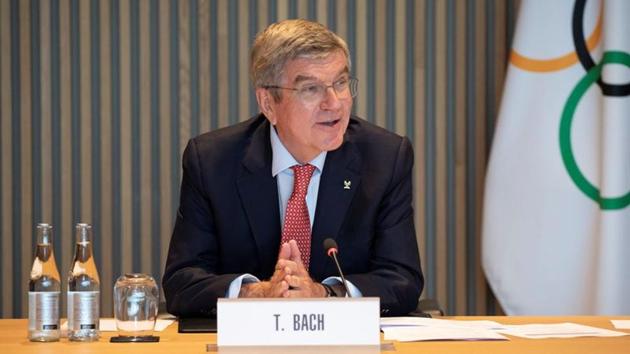IOC postpones 2022 Youth Olympics, says committed to hosting Tokyo Games in 2021
The IOC chief Thomas Bach accepted a proposal by Senegal president Macky Sall to postpone the Youth Olympic Games and the IOC Executive Board, which met online on Wednesday afternoon, gave the move its approval so as to allow more spacing out of events and better planning.
he International Olympic Committee (IOC) has postponed the 2022 Youth Olympic Games in Dakar, Senegal by one full-cycle i.e. four years to 2026 due to the still evolving Novel Coronavirus (Covid-19) pandemic but is still committed to organising the Tokyo 2020 Summer Olympics next year.

The IOC chief Thomas Bach accepted a proposal by Senegal president Macky Sall to postpone the Youth Olympic Games and the IOC Executive Board, which met online on Wednesday afternoon, gave the move its approval so as to allow more spacing out of events and better planning.
“The postponement of Dakar 2022 allows the IOC, the National Olympic Committees (NOCs) and the International Federations (IFs) to better plan their activities, which have been strongly affected by the postponement of the Olympic Games Tokyo 2020, by the subsequent postponements of major international sports events, and by the operational and financial consequences of the global health crisis,” Bach said in a teleconference following the EB meeting.
Bach said that one of the main reason for rescheduling the 2022 Youth Olympics was the proliferation of major Olympics and international events within a three year period due to the postponement of Tokyo Olympic Games to 2021 due to the Novel Coronavirus pandemic. Because of rescheduling of Tokyo 2020, major events like World Athletics Championships, World Swimming Championships and European Games too have to be moved around, thus pushing them all into a period during which IOC is also scheduled to host the 2022 Winter Olympic Games in China and the next Olympics in 2024 in Paris.
Bach said the decision on Dakar 2022 will not have an impact on Tokyo 2020 Games next year.
“We are working together with our Japanese partners and friends to celebrate the Olympic Games from July 23 to August 8 next year. The Youth Olympic Games in Senegal can’t be compared to Tokyo -- the Dakar decision was due to proliferation of five Olympic events in close proximity and the financial implications on the movement due to this. These are two different issues and we remain fully committed to seeing Tokyo 2020 next year,” the IOC president said.
He said the question of rescheduling Tokyo 2020 was not considered despite the continuing spread of the Covid-19 pandemic, which has so far infected more than 13.5 million people worldwide and claimed 583,415 lives till Wednesday afternoon.
With there being no vaccine so far and a spike in cases in Tokyo and Japan, many people have expressed doubts whether the Games could be organised as per the new schedule.
On Wednesday, a prominent Japanese government adviser claimed that the Tokyo Olympics may have to be postponed again if the novel coronavirus mutates into a stronger pathogen.
“I think the virus is mutating all the time ... it may be a much stronger virus that triggers a second wave,” Kiyoshi Kurokawa, who was appointed last month by the Japanese government to head a new panel to examine how to use artificial intelligence to fight the spread of the virus, told Reuters. “The Olympics may be postponed again, but I can’t predict.”
“I think it’s small incidents happening in Tokyo ... new cases are because people are not abiding by recommendations,” Kurokawa said of the current spike in infections. “But if there are some mutations, that is a completely different story. That could happen anywhere in the world.”
The IOC chief however said he would not like to predict what could happen in July next year.
“(Our) First priority is safety of all participants and we are working on multiple scenarios with the organisers regarding health situation. We do not know how things will be in 2021 but we are working with multiple organisations via a task force. We continue to be guided by the advice of the World Health Organisation (WHO) and based on this advice we are preparing multiple scenarios,” Bach said
Asked whether organising the Olympics behind closed doors was one of the options being considered, Bach said they would not prefer such a scenario.
“Multiple scenarios are being considered and that includes all different counter-measures. Olympic Games behind closed doors is something we do not want and we are working on solutions...which on one hand will ensure safeguarding of all participants and on the other hand maintaining the spirit of the Olympic movement,” Bach added.
AID TO INTERNATIONAL FEDERATIONS
The IOC on Wednesday decided to release $150 million, payable by end of this year, as aid to national Olympic committees (NOCs) and international federations (IFs) to tide over the financial distress caused by the Covid-19 pandemic.
The IOC has already supported the NOCs and IFs with more than USD 100 million since the outbreak of the current crisis. To date and as needed, USD 63 million have been allocated to IFs and USD 37 million to NOCs, the IOC said in a release.
Bach said that the amount that will be released next is also part of the $800 million aid it had announced for NOCs and IFs at the time of postponing the Tokyo Olympics. Many international federations are stressed financially because sporting activities are suspended and now they will have to replan and organise the Olympic Games qualifying events early next year. Because of the postponement of the Tokyo Olympics, they have not received the financial windfall due to them.






